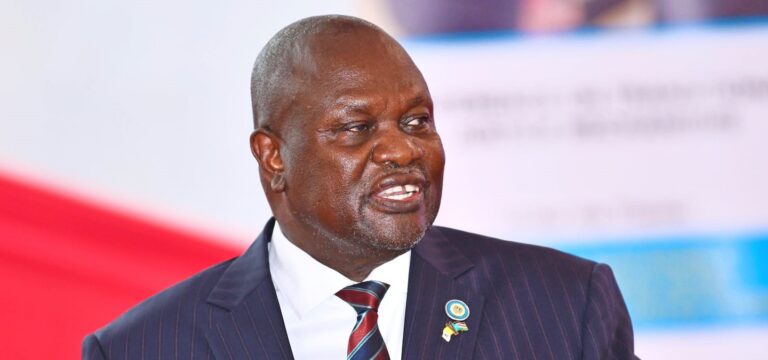The special court in Juba has extended its mandate to try the country’s suspended First Vice President, Riek Machar, and seven co-accused on charges including treason, after the defence argued the court was operating unlawfully.
The court’s original one-month mandate expired on Oct. 8, prompting Machar’s lead defence lawyer, Dr. Geri Raimondo Legge, to file a motion on Monday challenging its legality and jurisdiction.
During the 10th session on Wednesday, Presiding Judge James Alala Deng dismissed the challenge and formally extended the court’s term until the trial concludes.
The case, which began on Sept. 22, stems from a March 2025 attack on an army base in Nasir County that killed Gen. David Majur Dak and dozens of soldiers.
The government alleges the assault was carried out by forces loyal to Machar’s Sudan People’s Liberation Movement/Army-in-Opposition (SPLM-IO) and an allied militia known as the White Army.
Machar, 73, and his seven co-accused face charges of treason, crimes against humanity, mass murder, terrorism, and destruction of property.
The eight accused are: Riek Machar, 73; Puot Kang Chuol, 40; Mam Pal Dhuor, 37; Gatwech Lam Puoch, 66; Lt. Gen. Gabriel Duop Lam, 53; Kamilo Gatmai Kel, 47; Mading Yak Riek, 45; and Dominic Gatgok Riek, 27.
In Wednesday’s session, the court focused on the admissibility of evidence, specifically mobile phones seized from the defendants at the time of their arrest. The defence team argued the seizure was unlawful, saying it violated Article 22 of South Sudan’s constitution and several sections of the 2008 Criminal Procedure Act.
Defence lawyers contended the phones were taken without a warrant or proper judicial authorization, infringing the defendants’ rights, and urged the court to exclude them as evidence.
The prosecution maintained the phones were lawfully seized and registered as exhibits, describing them as key evidence linking the accused through communications.
Judge Deng expressed concern over repeated objections and procedural delays, warning they were undermining the trial’s progress. He directed both parties to expedite their submissions.
During the session, held at Juba’s Freedom Hall, prosecutors presented 16 exhibits. The presiding judge admitted 13, including a laptop belonging to Machar and mobile phones from all seven co-accused. A fourteenth exhibit was set aside for future cross-examination.
The admitted evidence also included three weapons—two rifles and a pistol—allegedly belonging to Brig. Gen. Kamilo Gatmai Kel, who denied ownership.
The court also noted that one of the accused had recently undergone an appendix operation while in custody, with Judge Deng thanking the National Security Service, police, and medical staff for providing care.
Judge Deng ordered that hearings will now continue three days a week—Monday, Wednesday, and Friday—and said the trial would proceed “day after day” until all evidence is presented.
The next session is scheduled for Friday, Oct. 17.




